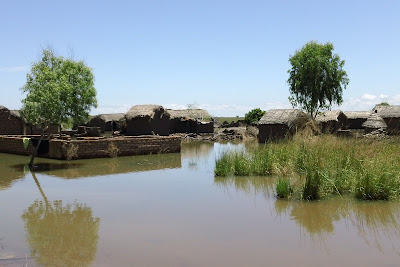 Mahamat Haroun Dahab, farmer, Chad: "What we really need here is schools, a flour mill and water"
Mahamat Haroun Dahab, farmer, Chad: "What we really need here is schools, a flour mill and water"
By IRIN
The southeastern Chad border district of Tissi has seen an influx of people fleeing violence in neighbouring western Sudan, among them Chadian nationals who had either migrated there for work or fled earlier violence, and new refugees from Sudan’s Darfur area.
Mahamat Haroun Dahab’s family (his wife and four children) are among those from eastern Chad who left the country seven years ago during the conflict there, for Darfur. They recently returned to their Tissi village of Tadjou, after fleeing inter-communal violence. Dahab and his wife told IRIN their story.
 |
Photo: Ann
Weru/IRIN
Mahamat Haroun Dahab and his wife in the southern Chad
village of Tadjou, in Tissi
|
[Dahab:] “I have been here for three months. I arrived in May when the Misseriya and Salamat [ethnic groups; the latter lives on both sides of the border] started fighting in Um Dhukun [Darfur]. I am not sure what they were fighting over. Around us there were people who were killed and injured.
“The journey from Sudan to the Chad border was by donkey. Then, once we were on the Chadian side, IOM [the International Organization for Migration] brought us here [to Tadjou village].
“We just packed what we had and sought safety; we did not have time to prepare ourselves.
“Here we are doing some farming, mainly of sorghum. Back in Um Dhukun I used to slaughter some sheep. I worked as a butcher. But I have always been a farmer.
“The land I had here before I fled is where I am planting my crops now; during the fighting this area was deserted and my land and house remained intact.
“None of my children have been to school. They are young and I don’t have enough money to register them.
“But I have no intention of going back to Darfur. Here, I can practice farming; there [in Um Dhukun] we had to buy things from the market.
“What we really need here is schools, a flour mill and water.
[Dahab’s wife - she did not give her name:] “We decided to leave [Um Dhukun] when our belongings, such as our [mobile] phones and livestock, started being taken by force by the Arabs.
“We are OK living here [in Tadjou] as we just go to the farm and come back.
“But the children really need schooling and some clothes. What we really want is schools.
“Myself, I have never been to school. I learned to speak Arabic because people around me speak it; but I can’t write anything or read. A person who doesn’t go to school can’t read Arabic.”
Visit www.irinnews.org
Follow Irin News on Twitter








